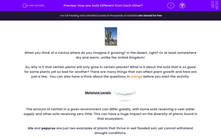
When you think of a cactus where do you imagine it growing? In the desert, right? Or at least somewhere dry and warm, unlike the United Kingdom!
So, why is it that certain plants will only grow in certain places? What is it about the soils that is so good for some plants yet so bad for another? There are many things that can affect plant growth and here are just a few. You can also have a think about the questions in orange before you start the activity.
Moisture Levels 
The amount of rainfall in a given environment can differ greatly, with some soils receiving a vast water supply and other soils receiving very little. This can have a huge impact on the diversity of plants found in that ecosystem.
Iris and papyrus are just two examples of plants that thrive in wet flooded soil, yet cannot withstand drought conditions.
Can you find out the names of any plants that grow in areas of low moisture?
Pollution Levels 
The pollution of soil is becoming more and more of a problem, with polluted water draining into streams, rivers, riverbanks and the soil itself. Many plants have managed to adapt to survive in polluted soil; however, there are still many plants that cannot.
What kind of plants do you think might grow in polluted soil?
Soil pH 
The pH of soil is extremely important. Farmers looking to grow different vegetables need to keep a close eye on the pH of their soils, as even the slightest change could destroy a whole crop.
Acidic Soil - Most vegetables prefer slightly acidic soil. A pH of around 5.5 - 6.5 is the prime pH for the growth of carrots, potatoes and peas etc...
Most vegetable crops are unable to grow below pH 5. Farmers often add lime to the soil to bring the pH back up closer to neutral.
Alkaline Soil - Many herbs prefer soil that is slightly alkaline, with parsley growing well at pH 7.5 - 8.
Again, crops will not grow well in soil that is too alkaline, so a pH above 8 could be a problem.
What could farmers do to the soil if it was too alkaline?
So how can the pH of soil change?
There are many reasons why soil may become acidic or alkaline such as rainfall, the decay of organic materials and the harvesting of crops.
Use this activity to find out more about soils and how important they are to life on our planet.








